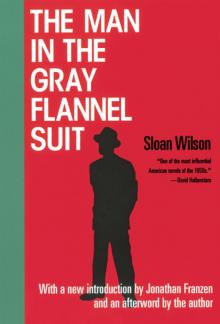- Home
- Sloan Wilson
Man in the Gray Flannel Suit Page 15
Man in the Gray Flannel Suit Read online
Page 15
Nothing’s wrong with our marriage, or at least nothing permanent, Betsy thought. We can’t be like a couple of children gaily playing house forever.
That’s the way it had been before the war–like children playing house, she thought, but even the sarcasm of the phrase couldn’t tarnish the memory. They had had only three months together before Tom went into the Army. How exciting those days had been! He had spent an absurd proportion of his savings on her engagement ring and a diamond-sprinkled wedding ring to match. At the time she had remonstrated with him, and it was curious to remember now that that jewelry, bought with a brave gesture of gallantry, had turned out to be the only shrewd investment they had ever made. The last time she had had the rings cleaned, the jeweler had offered her far more than Tom had paid for them, because diamonds had increased in value a great deal since the war.
That somehow seemed typical of the way everything had turned out, Betsy thought. The foolish gesture had turned out to be a shrewd investment, and most of their careful planning had led to nothing. I would like to go back to the beginning, and follow the years along, and find out what went wrong, Betsy thought. After she and Tom had been married, they had moved into a tiny apartment in Boston, and upon her request, Tom had immediately bought a Saint Bernard puppy and a white Angora kitten with blue eyes, because in the old house on Beacon Hill, her family had never allowed her to have pets. Now her clearest memory of those three months before the war was of the great clumsy puppy and the wide-eyed kitten and Tom and herself, all rolling and tumbling and playing together on the floor, with the sunshine streaming in the window on a big red and gold oriental rug someone had given them for a wedding present.
Like children playing house, she thought. During the first two days they lived in that apartment, she had ordered milk from two milkmen, because the second one had been a very aggressive salesman, and the icebox had been jammed with milk bottles until Tom straightened the matter out. The kitchenette had been fragrant with spices throughout those three months–she had experimented with almost every recipe in the cookbook. Meals had not seemed simply a chore to get through as quickly as possible then.
We weren’t too young to be married in those days, she thought–I think the trouble is that although only twelve years have gone by, we are somehow too old to be married now. I suppose that’s really why I want to move out of this house so much, Betsy thought–I don’t want a bigger place so much; I want that old three months before the war back. It’s as though Tom and I had been married twice, once before the war and once afterward, and what I want is my first marriage back.
“Now mark my words,” Alice had said.
Damn Alice, Betsy thought now. I’m still not sorry I got married, and I’m glad I didn’t take her advice. Ever since the war, poor Tom has just had to work awfully hard, and he has lots of worries on his mind. And I’ve been tired, what with taking care of the kids and all. We’re both exhausted most of the time–the Tired Thirties, the doctor called it once, the time when people have children, and have to make good at jobs, and buy houses, and all the rest of it. We’re both just tired out. That’s why nothing seems to be much fun any more.
There, I’ve said it, she thought, and it sounds absurd, but it’s true. Nothing seems to be much fun any more. There’s nothing wrong with our house, really, and nothing wrong with Greentree Avenue, or Tom or me. It’s just that nothing seems to be much fun any more, and that’s horrible, for when you’ve said that, there’s nothing more to say.
Why? she thought.
It probably would take a psychiatrist to answer that. Maybe Tom and I both ought to visit one, she thought. What’s the matter? the psychiatrist would say, and I would reply, I don’t know–nothing seems to be much fun any more. All of a sudden the music stopped, and it didn’t start again. Is that strange, or does it happen to everyone about the time when youth starts to go?
The psychiatrist would have an explanation, Betsy thought, but I don’t want to hear it. People rely too much on explanations these days, and not enough on courage and action. Why make such a complicated thing out of selling this house? We don’t like Greentree Avenue, so we’ll move. Tom has a good job, and he’ll get his enthusiasm back, and be a success at it. Everything’s going to be fine. It does no good to wallow in night thoughts. In God we trust, and that’s that.
Betsy’s fists were clenched, and her lips pressed tightly together, just as they had been when, as a little girl, she had gone up through the shadows to bed, determined not to admit her fear or her jealousy of her sister, sitting by the fire and laughing below. She glanced at Tom, and seeing that the blankets had slipped from his shoulders, she carefully covered him up. Then she went to sleep, and when she awoke in the morning, she was as energetic and cheerful as ever, humming a tuneless song under her breath as she got breakfast and drove her husband to the station.
Four days after he had visited Hopkins’ apartment, Tom typed for the fifth time his final draft of a first draft of Hopkins’ speech. From the first sentence (It’s a great pleasure for me to be here this evening.) to the last sentence (It’s a job that can be done.), it seemed to Tom to go quite well. True, it all had a rather otherworldly ring to it, but no matter how hard Tom tried, he couldn’t make it appear quite natural for the president of United Broadcasting to be talking about mental health at all. When he had polished the speech as much as he could, he handed it to his secretary, who retyped it neatly with three carbon copies. Two of these Tom filed and took the original with one copy to Ogden. He didn’t expect Ogden to throw up his hands and cheer when he read the speech, but he was totally unprepared when Ogden, after finishing the first two pages, slammed the speech down on his desk and said, “Christ! This is awful! It isn’t what we want at all!”
For the first time in years, Tom felt his face turning red.
“You can do better than this!” Ogden said contemptuously, before Tom had a chance to say anything. “Take it back and do it over. See if you can have something ready by tonight. Mr. Hopkins wants to see you at his apartment at eight-thirty. And this time, really try.”
“I’ll try,” Tom said in an unnaturally quiet voice. He had a sudden, immediately controlled impulse to kill Ogden. He knew just how he could do it–he’d clench both hands together, raise them high above his head, and, using the full strength of his back, bring them down hard on the back of Ogden’s neck. Shaken by his own thoughts, he picked the speech up and walked back to his office. Glancing at his familiar, thick old wrist watch, he saw he had nine hours in which to work. He rolled a clean piece of paper into his typewriter. “It’s a great pleasure to be here this evening,” he began, and crossed it out. “I’m deeply grateful for this opportunity to talk to you this evening,” he substituted. No, damn it! he thought, and crossed that out. “It gives me the greatest pleasure . . .”
At eight-thirty that night he knocked blearily at the door of Hopkins’ apartment, clutching the retyped speech in a manila envelope in his hand. Hopkins let him in, again thanked him for coming, and gave him a drink. Tom handed him the speech and, unable to watch him read it, walked self-consciously across the room to inspect the lead soldiers. They were hand-painted, in astonishing detail. On the top shelf was a small group of knights in armor. He wondered how long it would take Hopkins to read the speech. At least he hadn’t thrown it down yet, and he must have finished the first page. On the second shelf was a company of English archers, apparently aiming their long arrows at a platoon of soldiers waiting for the American Revolution. Behind him, Tom heard a page rustle, and Hopkins cleared his throat. On the middle shelf were Civil War infantrymen of both North and South, apparently teaming up against some World War I artillerymen. Behind him, Tom heard a match scratch, and Hopkins’ chair squeaked. He must be half through it, Tom thought. On the bottom shelf were several squads of World War II marines, all standing at attention. Somewhere in the room a clock ticked.
“Wonderful!” Hopkins suddenly boomed.
Tom turned around
.
“Marvelous,” Hopkins said, even louder. His whole face was beaming with satisfaction. “You’ve really got the feel for it!”
“I’m glad you like it,” Tom said modestly.
“This really sings,” Hopkins said enthusiastically. “It’s remarkable that you could do so well the first time around!”
“It’s a second draft, actually,” Tom said. “Mr. Ogden gave me some suggestions.”
“The heart of the thing is just right!” Hopkins said. “Now let’s just go over it together. Did you bring a copy?”
Tom took one from the manila envelope.
“Let’s look at this introduction,” Hopkins said. “Do you think we could make it a little more natural? How about, ‘Good evening. It’s good of you gentlemen to give your attention to a layman. . . .’ ”
Sentence by sentence Hopkins took the whole speech apart. When he finished, he had asked for changes in almost every paragraph. “Well!” he concluded. “You certainly did a grand job! Just fix up the details we’ve worked out and let’s see it again in a few days. Would Wednesday be too early?”
“That will be plenty of time,” Tom said.
“Can I fill your glass for you?”
“Sure.”
“You’ve really got the feel for this sort of thing,” Hopkins said, while putting fresh ice cubes in his glass. “You’ve made a grand beginning!”
“Thanks,” Tom said.
There was a knock at the door, and Hopkins let in a thin man holding an enormous blueprint, rolled up like a rug.
“Good evening, Bruce,” Hopkins said. “So nice of you to give up your evening!”
Tom gulped his drink and excused himself as rapidly as possible. He was halfway to Grand Central Station before he fully realized that Ogden and Hopkins had simply told him the same thing in two different ways: to rewrite the speech. In spite of this, Hopkins had somehow left him eager to try. Well, he thought admiringly, I always heard he could drive men and make them like it.
16
A WEEK LATER, just when Tom was forgetting his apprehension about meeting Caesar Gardella, it happened. He had been working late on the speech, and it was about seven-thirty when he rang for the elevator. The corridor by the elevators was empty. When he pressed the button there was the prolonged hum which always preceded the coming of the elevator. The doors rumbled open, and there was Caesar, standing alone in the entrance to the car, his big round face impassive. “Going down,” he said in his deep voice. Tom stepped into the elevator. Caesar turned toward the controls, and the door rumbled shut behind him. Caesar stood with his back toward Tom. The elevator dropped sickeningly fast. Then Caesar turned toward Tom. His face was without emotion. “You’re Captain Rath, aren’t you?” he said.
“Yes,” Tom replied, and, trying to feign surprise, added, “Why, you’re Caesar Gardella!” He stuck out his hand, but just then a light flashed on the control board of the elevator, and Caesar brought the car to a halt at the nineteenth floor. The door rumbled open, and two pretty secretaries stepped in. “We’ll be late, I know we’re going to be late, and they’ll never wait!” one said.
“They’ll wait, all right,” her companion replied. “It’s a good thing to keep them waiting.” The elevator started down, and both girls laughed.
When they got to the ground floor, the secretaries hurried out of the elevator. Tom stayed behind awkwardly. He wanted to say, Did you go back to Rome? Did you ever hear what happened to Maria? But instead, sounding foolish to himself and talking very fast, he said, “It certainly is nice to run into you, Caesar! It’s been a long time! Gosh, I guess it’s been almost ten years, eight or nine, anyway! You’re looking good, boy! Sure looks as though civilian life is agreeing with you!”
Caesar smiled. “You’re not doing so bad yourself,” he said. “I seen you riding down with Mr. Hopkins. You an assistant of his or something?”
“Yes,” Tom said. “I’m working for him.”
There was an awkward silence, during which the smile disappeared from Caesar’s face.
“I’ve got to be running,” Tom said, edging toward the door. “Got a train to catch. Sure is nice to have seen you!”
“Could we get together sometime?” Caesar blurted out quickly. He suddenly seemed nervous and pushed his purple cap back on his head. “Just for a drink or something,” he said. “I’d kind of like to talk to you.”
“Sure,” Tom said hesitantly. “Sure, I’d love to!” Seized with a desire to get the meeting over, he added, “How about now? I could catch a later train.”
“No,” Caesar replied. “I’m on duty for another two hours. Can I give you a call sometime when I’m not on duty?”
“Sure!” Tom said. “Any time! Give me a call!”
Lights were flashing on the elevator’s control panel, and the starter was walking toward them. Tom hurried out of the elevator, waved cheerily, and walked rapidly toward Grand Central Station. He wants to see me, he thought. What about? To talk over old times, perhaps–that’s a perfectly normal thing to do. We meet and have a drink and we make jokes about the war. That’s all there is to it. What else could he do?
Blackmail. The word flashed into his mind suddenly. That’s absurd, he thought. In the first place, Caesar would never do a thing like that. He was always a decent guy. And in the second place, there’s a statute of limitations. And in the third place, he couldn’t prove anything, especially after all this time, When you come right down to it, I haven’t done anything illegal anyway, or at least nothing anyone could do anything about. Maria wouldn’t turn on me now.
Still, Caesar could make things rather awkward for me, Tom thought. Publicity–if he made any charges, the publicity alone could ruin me. And he probably thinks I’m rich, seeing me with Hopkins and all. I wonder what he’s got on his mind? Maybe he knows something about Maria, something he wants to tell me.
No, Tom thought as he got to Grand Central Station, it’s not that. Two old buddies meet and have a drink together, that’s all–that’s the convention, and Caesar’s just trying to play it according to the script. It’s ridiculous to worry. I’ve got to learn simply to relax and take things as they come. I’m tough and I’m not going to get weak-kneed now.
The next day he expected Caesar to call and was tense whenever his telephone rang, as well as whenever he got on an elevator, but he neither saw nor heard from Caesar. The day after that nothing happened, and the day after that. Probably he never will call me, Tom thought–probably this is the way it’s going to end. It’s quite possible, in fact, it’s probable that the poor guy was just trying to be polite. As more days went by with no word from Caesar, Tom’s conviction that this was so deepened. He’s probably embarrassed to call me, he thought. After all, the gulf between an elevator operator and an assistant to the president of a large corporation is greater than that between a corporal and a captain in the Army. He was trying to be polite, Tom told himself over and over, and I’ll probably never hear from him again. If we meet in the elevator, we’ll just nod at each other, and that will be that.
During the next week, Tom did four more drafts of the speech, each of which Ogden vilified and Hopkins praised highly before asking for a rewrite. Tom got to the point where he mumbled phrases from the speech in his sleep. “It’s a great pleasure . . .” he groaned at three o’clock one morning.
“What?” Betsy asked, startled.
“A real pleasure to be here with this distinguished company this evening. . . .”
“Wake up!” Betsy said. “Wake up! You’re talking in your sleep!”
The fear that he was proving an utter failure in his new job grew. He would have quit in discouragement if it hadn’t been for Hopkins’ praise, which grew in warmth as the number of discarded efforts multiplied, and which somehow never failed to sound utterly sincere. Maybe he just goes on like that till he definitely makes up his mind to fire you and then lets you have it between the eyes, Tom thought. But why should a guy like that lie? Maybe he does t
hink I’m doing a good job. Maybe he expects a speech to be written a thousand times.
Tom didn’t know. Every time Hopkins built him up, Ogden tore him down. “It’s getting worse,” Ogden said when he read the third draft. “Give it a fresh approach! Put some oomph into it!”
There was only one comforting thought. The speech would have to be completed before many weeks went by, if Hopkins were going to give it at all–it wouldn’t really be possible to go on rewriting it forever.
A week later, when Tom was in the middle of his sixth draft of the speech, and apparently no closer to an acceptable final draft than ever, his mind was distracted by a simple event: Betsy sold the house in Westport and agreed to get out of it within two days. Tom had been falsely reassured by the fact that not many people had inspected the house, and he had figured it probably would take some time for Betsy to put her plans into action. “But why did you agree to get out in two days?” he asked in dismay when she told him she had accepted an offer of sixteen thousand dollars.
“He wanted to move his family in–he’s just come from Chicago,” Betsy said. “It was such a good price he offered, and I was afraid he’d get away.”
“How can we do it?” Tom asked. “We’ve got to pack china, and clothes, and everything! And I’m going to be working day and night on this speech!”
“Don’t worry about the packing,” Betsy said. “I’ll have everything ready. The movers will come Saturday morning, and Saturday afternoon we’ll all pile in the car and drive to South Bay.”
The next evening when Tom got home from New York, every room in the house was cluttered with cardboard boxes and barrels.
“Daddy!” Janey said delightedly. “Momma said not to mind about keeping things neat!”
Tom looked around the disordered house, and suddenly it was unutterably dear to him. The crack like a question mark in the living-room wall, the shabby furniture, the worn linoleum on the kitchen floor–all seemed part of something precious that was slipping fast, something already gone which never could be retrieved. He went to the kitchen cupboard where the liquor was usually kept, but it was gone, and the empty cupboard was neatly lined with clean white paper.

 A Summer Place
A Summer Place Pacific Interlude
Pacific Interlude Man in the Gray Flannel Suit
Man in the Gray Flannel Suit Ice Brothers
Ice Brothers